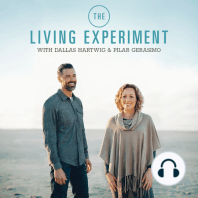70 min listen
Episode 16: Shame
FromThe Living Experiment: Rethink Your Choices. Reclaim Your Life.
ratings:
Length:
73 minutes
Released:
Nov 7, 2016
Format:
Podcast episode
Description
Shame is universal. It touches every age, gender, and ethnicity — from a child who wets the bed to a presidential candidate who is caught off guard in a debate. Shame operates at your core, often playing out in a debilitating combination of aggression, withdrawal, and perfectionism. But how can you address shame if you have difficulty acknowledging or talking about it? In this week’s episode of The Living Experiment, we discuss shame openly, flushing it out of hiding and into the light of day. We talk about where shame comes from, how men and women feel it differently, and how it impacts relationship dynamics. We also suggest steps to shift from shame toward self-acceptance and insight. "Shame" Episode Highlights The life-long and inescapable human condition of shame (3:25) Defining (and differentiating) shame and guilt (6:30) The three primary behavioral expressions of shame (7:25) Secondary and tertiary consequences, including communication problems (7:50) The subtle differences between imposing shame and offering compassionate guidance (10:00) How shame that develops very early in life can manifest in our adult lives and relationships (12:50) Perfectionism as a response to childhood shame (14:25) Shame as a potential outcome of a religious upbringing (15:15) How your own sense of worth influences the way you accept or judge others (17:55) Dr. Marilee Adams’ "Choice Map" and the two paths — judger or learner — we can take in any stressful situation (18:45) Gender-specific shame triggers and responses (23:55) Dallas's early experience with shame, and the shadow it cast (26:00) Pilar's experience of shame resulting from childhood sexual abuse (29:50) How (and why) we make sense of irrational thoughts and situations, and why that's not always healthy (31:00) How shame shows up in human behavior (33:50) Dr. Brené Brown’s outing of the universal, destructive experience of shame (37:45) Shame-based morality vs. the natural consequences of potentially problematic actions, such as over-consumption of porn or food (38:45) The power of acknowledging and exposing sources and feelings of shame (42:20) How Eye Movement Desensitization and Reprocessing (EMDR) therapy can help people evolve traumatic experiences (44:20) “De-cloaking” — risking the truth about yourself with close friends, and the positive feedback loop that can create (47:10) How to re-frame and diminish shame with self-awareness and compassion (53:00) Making peace with your life experiences — good and bad — to more fully understand and accept yourself and others for who they are (55:40) How a difficult divorce can catalyze the work of self-discovery (57:25) The vicious cycle of poor communication between men and women – women's unarticulated desires leading to men's misguided efforts to fulfill them — and how to reverse the pattern (1:00:00) Framing failure without shame rather than denying failure happened (1:05:00) Suggested experiments for the week (1:08:20) This Week’s Experiments Dallas suggests: Identify and compassionately acknowledge your shame. On a piece of paper, write “I have shame about . . .” and list all of your feelings of shame. On the last line of the page, write, “And it’s OK.” Calling shame by its name and accepting yourself sets the stage for growth. Pilar suggests: In the moments you feel shame, change the questions you ask. The next time you're tempted to go down a path of self-retribution (e.g, why am I so stupid; what's wrong with me; what will people think?), ask neutral, non-judging learner questions such as: “What just happened?” “What’s useful here?” “What do I want now?” “What would I like to have happen?” “What can I learn?” “What am I actually responsible for?” “What’s possible?” “What are my choices?” “What would be the best use of my time, energy, and attention now?” Embrace shame-tinged experiences as fertile ground for growth and self-honoring rather than self-reproach. Look for opportunities to reframe shame-based experiences from
Released:
Nov 7, 2016
Format:
Podcast episode
Titles in the series (100)
Episode 25: Masculine and Feminine: This week on The Living Experiment, in what Dallas calls our "most terrifying episode" to date, we're talking about the qualities of masculinity and femininity. What does it mean to be masculine or feminine, and how do these traits both limit and... by The Living Experiment: Rethink Your Choices. Reclaim Your Life.
